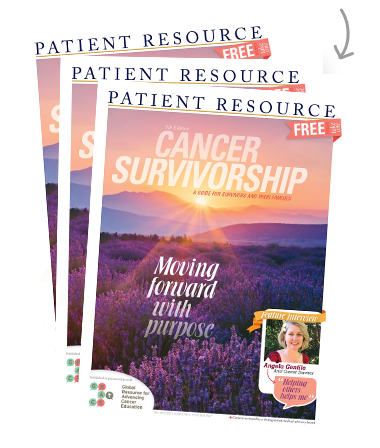Survivorship
Understanding The Emotions That Accompany Survivorship
Taking care of your emotional well-being after treatment ends is just as important as addressing physical effects. Certain feelings may take you by surprise. Instead of being relieved as you might expect, you may be worried, fearful, guilty or depressed. It is important to know that these feelings are completely normal, and there is no magic switch that will make you feel the way you did before your diagnosis. Making a plan for managing these feelings is important for your emotional health.
Family and friends are wonderful sources of support, but they can only understand so much. Find a support group for cancer survivors online or in your area. Opening up to people who have had a similar experience can offer comfort and support that is invaluable. Various supportive care resources and services are designed to help you through this phase, including counselors and therapists with expertise in working with people living with cancer.
Contact your doctor about excessive crying or continued feelings of hopelessness or despair. Get immediate medical attention for thoughts of suicide or death. You’ll have ups and downs that may be unpredictable, but you don’t have to go through them alone.
Below are some of the common emotions you may have.
Anxiety about your future can begin at any time and can continue until it is addressed. Moderate to severe anxiety is often treated with medication, therapy or a combination of both. Explore relaxation techniques, such as meditation, muscle relaxation, yoga or guided imagery. Peer-to-peer cancer support volunteers can offer insight, and they’re often available by phone or online.
Depression is a psychological reaction to your situation as a whole. Certain ongoing treatments or maintenance therapies, such as chemotherapy or hormone therapy, can also cause or contribute to depression. Don’t avoid talking to your doctor about it because you think depression is just part of having cancer. It should be treated. It is extremely important to talk with your doctor about feeling hopeless, helpless or numb. If these feelings last more than a few days or if you have thoughts of death or of attempting suicide, seek medical attention immediately.
Doubt can lead to confusion and questions about the meaning of life and its purpose. Some people find strength in support from family, friends, the community or spirituality. It may also help to talk about your feelings with a counselor or support group.
Emotional insecurity about physical changes can affect your self-esteem and body image. Although physical health is the priority realistically, your emotional well-being may suffer when you don’t feel good about yourself. For example, even if you are completely confident in your decision to have a mastectomy, you may feel deep loss once your breasts are gone. Treatments may leave scars, discoloration of the skin, hair loss and lymphedema, which can all affect mood and self-image. Or, you may have sexual side effects from treatment that have affected your performance or feelings of desirability.
Fear about a recurrence or secondary cancer because you are no longer in active treatment is common. Making long-term plans may become difficult because every ache and pain triggers a concern that cancer has returned. Develop a comprehensive follow-up care plan to help calm these fears. Do your best to stay focused on the present.
Guilt may occur if you feel you’ve been a burden to loved ones or if you wonder why you survived when others with similar conditions didn’t. Talk with a therapist about these feelings. You might find that you can lessen your guilt by giving back to the cancer community. Helping others can provide a sense of purpose and well-being that can help take away blame you may be placing on yourself.
Stress is common for you to feel as you transition from patient to survivor, but watch for signs of post-traumatic stress (PTS). It can occur any time after treatment. Although PTS is not as severe as post-traumatic stress disorder (PTSD), the symptoms are similar. They include feeling defensive, irritable or fearful; inability to think clearly; difficulty sleeping; avoiding people; and losing interest in life. PTS may be treated with medicines (anti-anxiety drugs or antidepressants), relaxation training, support groups or cognitive behavioral therapy.
Recognizing and Managing Scanxiety

Follow-up appointments may cause you to feel anxious or tense. This is known as scanxiety and can apply to any of the imaging scans, laboratory tests or exams you have as part of your follow-up plan. These feelings are understandable because the results will indicate whether your treatment is working the way it is intended. You may begin to feel anxious as the appointment nears and stay that way until you get your results. That is a lot of stress to put on your mind and your body, and it may help to find ways to manage it.
- Set expectations with your doctor or nurse about when and how you will receive the results so you are not left waiting and wondering.
- Remind yourself that it is normal to feel this way. Consider discussing your fears with your friends, a support group or a therapist.
- Keep your mind occupied with things you enjoy, such as reading, playing games or gardening. Staying busy gives you less time to worry.
- Try to calm your nerves with meditation, yoga or deep breathing.
The Role of the Caregiver After Treatment Ends
Once your loved one with cancer transitions away from their primary treatment schedule, your role as a caregiver also transitions. You will begin to adjust back to your previous lifestyle from before treatment began. Such a change can bring surprising emotions with it. It’s possible that more intense feelings may emerge because you may now have more time to process what’s happened. If you find the emotions are ongoing or overwhelming, consider talking with your own doctor or a mental health specialist. It is common to remain worried that your loved one’s cancer will return. Attending post treatment follow-up appointments is both important for the survivor and the family/caregiver. Many people experience what is sometimes referred to as “scanxiety” as follow-up tests are conducted. Try to adopt the attitude that you’ll have time to worry later if you hear concerning news, and otherwise proceed as normal even when the time for these tests come around on your calendar. Don’t be surprised if your loved one, or even yourself, find a desire to arrange priorities differently from before the diagnosis. Getting back to normal is great, and enhancing normal is good, too.



